Sustainable Garden Design: Creating Eco-Friendly Landscapes That Last

CEO & Garden Designer
Ruth Marshall
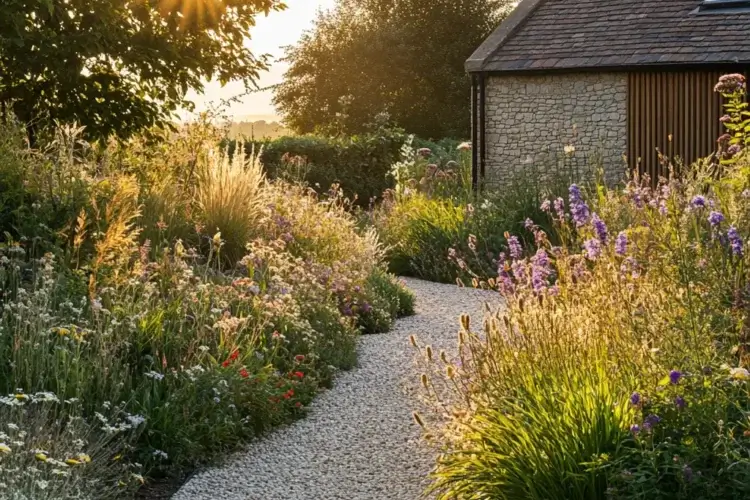
In the UK and beyond, sustainable garden design has moved from a niche concern to a central priority. From climate resilience to biodiversity, clients are increasingly looking for outdoor spaces that are not only beautiful but also environmentally responsible. At CGLA, we believe that exceptional landscape design must tread lightly on the planet—balancing aesthetics, ecology, and long-term performance. Whether you’re planning a new garden or upgrading an existing space, we’re committed to delivering eco-friendly landscaping solutions that work in harmony with the site, the seasons, and the natural world.
What Is Sustainable Garden Design?
Sustainable landscaping goes far beyond installing a water butt or adding native plants—though both are excellent steps. True sustainability involves a considered, site-wide approach that:
- Minimises environmental impact
- Supports wildlife and pollinators
- Enhances soil health
- Adapts to the UK’s changing weather patterns
We consider everything from site orientation and microclimates to soil types and existing ecosystems. Sustainability isn’t a final flourish—it’s embedded from the earliest design conversations to the final plant installed.
Biodiversity Net Gain in Garden Design
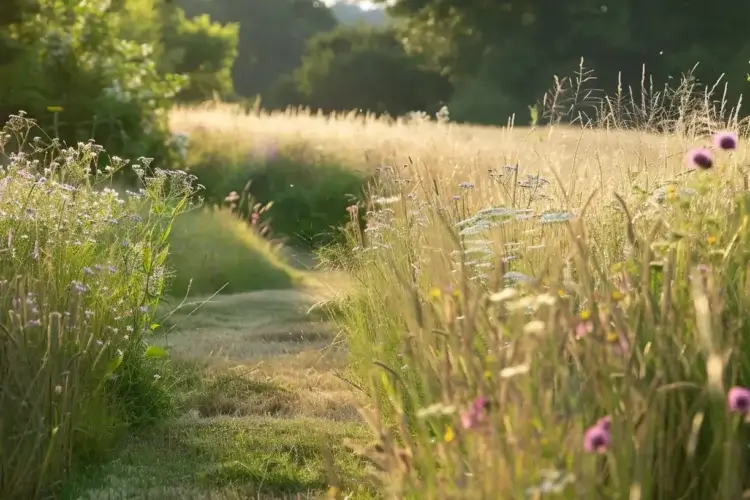
With new UK planning regulations requiring a biodiversity net gain for most new builds, it’s never been more important to integrate ecology into your outdoor space. As we outline in our article on Why Biodiversity Net Gain Matters, this isn’t just a regulatory hoop to jump through—it’s a design opportunity. We treat biodiversity enhancement as a core feature of the landscape: whether through pollinator-friendly planting, meadow zones, or integrated wildlife habitats, we create gardens that truly support nature.
Water Management for Resilient Landscapes
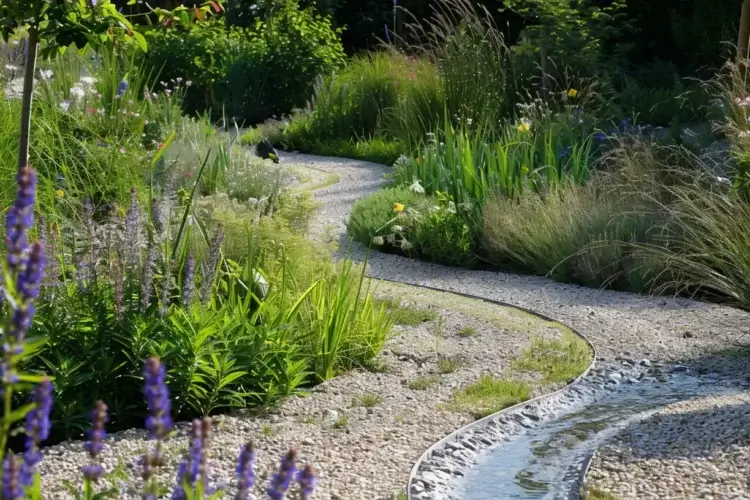
Water Management for Resilient Landscapes Given the UK’s increasingly erratic weather—alternating between prolonged drought and heavy rainfall—sustainable water management is essential.
At CGLA, we use a range of techniques to help our landscapes manage water naturally:
- Permeable paving (e.g. gravel, resin-bound, porous block)
- Rain gardens and swales to capture and slow runoff
- Tanks for rainwater harvesting and grey water systems for irrigation
- Drip irrigation and rain sensors, which conserve water and maintain optimal moisture levels better than traditional soak-and-dry approaches
Eco-Conscious Planting Design
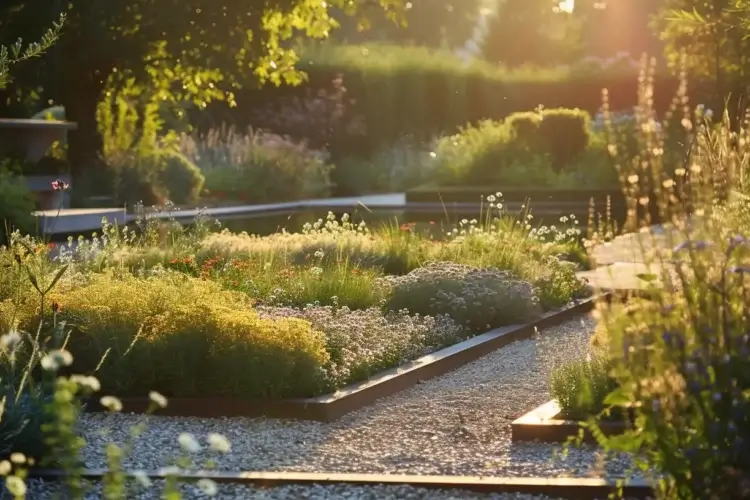
Planting is the backbone of sustainable landscaping. Instead of forcing a planting style onto the land, we ask: What will thrive here with minimal intervention?
We favour:
- Native and well-adapted species
- Wildflower meadows and species-rich lawns
- Pollinator corridors, hedgerows, and layered planting structures
In Oxfordshire, we replaced a large formal lawn with a wildflower-rich matrix, threading mown paths throughout. The result? Lower maintenance, higher biodiversity, and a garden that changes beautifully with the seasons.
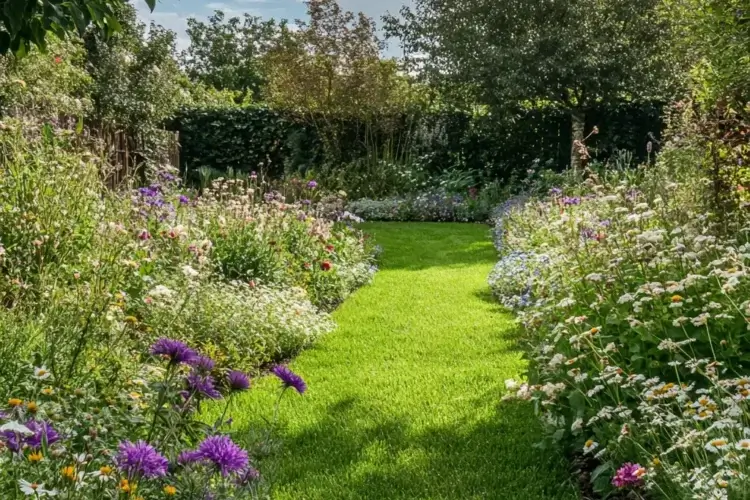
Sustainable Landscaping Materials
Material choice has a huge impact on the carbon footprint of garden construction. At CGLA, we prioritise:
- Locally sourced materials, and responsible suppliers such as London Stone, who are committed to ethical sourcing and are working towards ISO 14001certification
- Recycled and repurposed materials
- FSC-certified timber, low-carbon concrete alternatives, and sustainably quarried stone
We also work with nurseries like Majestic Trees, who use peat-free compost, harvest rainwater, and manage their site to support biodiversity—ensuring that even the plants we source come with a sustainable story.
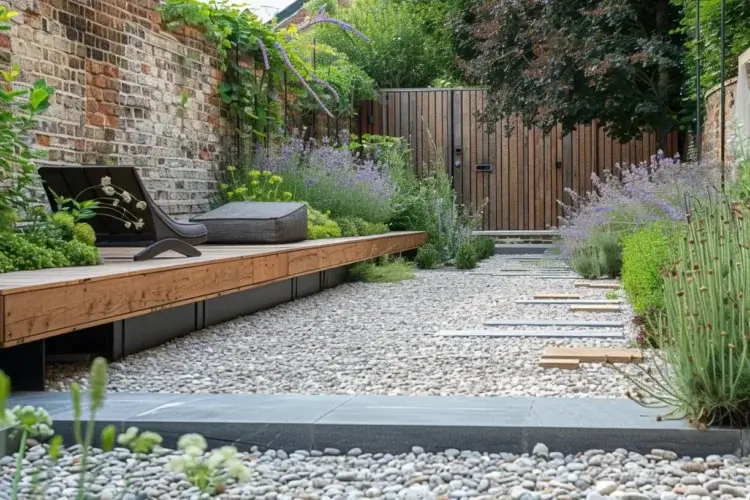
Eco-Energy and Material Efficiency in Garden Design
Energy use and material efficiency are often overlooked, but they’re vital for a low-impact landscape. Our designs incorporate:
- Low-energy LED and solar lighting
- Discreet lighting schemes that reduce light pollution, using motion sensors and downward-facing fixtures to protect nocturnal wildlife
- Natural boundaries, such as native hedging in place of fencing, to reduce reliance on resource-intensive hard landscaping
These strategies allow us to reduce the overall quantity of materials used, while increasing the ecological function and visual richness of each space.
Wildlife-Friendly Garden Design
Every garden can be a refuge—for birds, bees, amphibians and people alike. We frequently include:
- Bird boxes, bee hotels, and log piles
- No-mow zones or flowering turf
- Wildlife ponds with native aquatic planting
In a recent contemporary country garden, we paired sculptural planting with composite decking from Millboard—which uses recycled materials and embodies a commitment to sustainability—alongside a large pond fringed with extensive planted banks and marginal planting. Within weeks, frogs, dragonflies and birds had made themselves at home.
Sustainable Design Is a Long-Term Vision
Ultimately, sustainable garden design is about legacy. It’s about creating spaces that:
- Age beautifully
- Support ongoing biodiversity
- Require less input to thrive
- Continue to bring joy and balance to people’s lives
As designers, we feel both the privilege and the responsibility of shaping landscapes that will endure—visually, ecologically, and emotionally. For further reading, the Royal Horticultural Society’s advice on sustainable materials is a useful resource.
Let’s Design a Garden That Gives Back
Whether you’re working with a small urban courtyard or a large country estate, our approach remains the same: sustainable design should be as beautiful as it is responsible. If you’re ready to explore how we can make your garden more eco-friendly, we’d be delighted to talk through ideas tailored to your space.
CGLA are an award winning team of Garden Designers, Landscape Architects, Landscapers and Garden Maintenance Operatives working in Buckinghamshire, London and the South East, as well as on prestigious design projects across the UK and abroad. We are currently working in Oman, Jersey and France, and welcome enquires for design, landscaping or garden maintenance. Contact us here